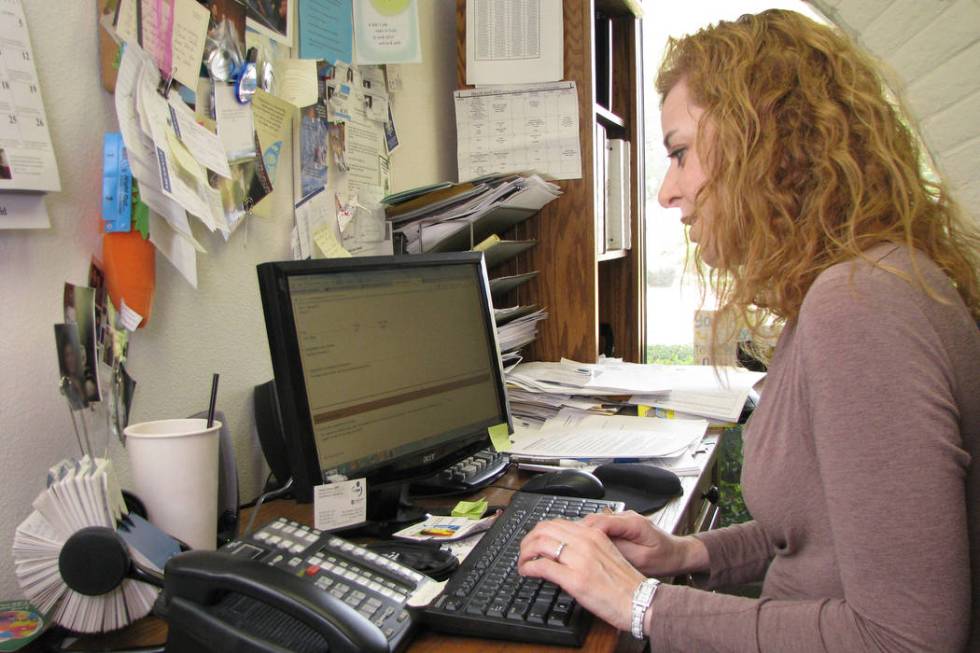Las Vegas rape crisis center sees uptick in help requests

In the wake of the #MeToo movement, Las Vegas police and local rape crisis center data show that more sexual assault victims came forward last year.
CLICK TO ENLARGE
“This is the kind of fundamental shift in thinking that we’ve been working toward for a long time in terms of believing victims and having widespread community support when people do come forward,” said Daniele Dreitzer, executive director of the Rape Crisis Center of Southern Nevada, 801 S. Rancho Drive.
The #MeToo campaign was born in 2006 but gained widespread attention in 2017 as tens of thousands of survivors flooded social media with the hashtag #MeToo in the wake of sexual abuse allegations against movie producer Harvey Weinstein.
That same year, the center, which serves all of Clark County, saw a 28 percent increase in demand for counseling in 2017 and conducted more than 2,125 hours of counseling sessions throughout the year.
But according to Dreitzer, it’s the number of victims the crisis center assists at hospitals that has seen a steady increase since at least 2015. Records maintained by the center show that last year the organization met and assisted 747 victims at local hospitals, up about 4 percent from 2016. But Dreitzer said that value represents only the number of victims who agree to have a forensic sexual assault exam, which indicates a gap in sexual violence data.
“These year-over-year increases again tell us more people are coming forward and reaching out for help,” Dreitzer said. “But often we also see individuals who come for the exam but don’t report the crime.”
Historically, the majority of sexual assaults are not reported to police, according to the Rape, Abuse and Incest National Network. This is partly because survivors fear retaliation or believe that law enforcement will not help them, according to the network.
Still, the number of reported rapes in the Las Vegas Valley increased 8.4 percent last year, when Metro investigated 1,249 cases. The department said it investigated 97 fewer known cases of rape in 2016.
“It is a very hard crime to pin down because it continues to be underreported, but we don’t always necessarily look at an increase in numbers as a bad thing if it means people are feeling more comfortable reporting crimes when they happen and feeling confident that they will be fairly treated in our justice system,” Dreitzer said. “We take those as good signs that the message is getting out while also being saddened that this continues to be a very prevalent issue.”
Data maintained by the Rape Crisis Center also show that men are less likely to report sexual assault than women. Dreitzer said this is another contributing factor to the historical gap in sexual assault crime data.
Of the 747 victims who agreed to a forensic exam last year in Clark County hospitals, just 5 percent were male, according to the organization.
“There’s this societal myth that men want to have sex all the time, and that’s not true at all,” Dreitzer said. “Especially for young boys, it can be very confusing because as humans, we’re physical creatures with physical responses to stimuli. Just because our body responds one way, (that) doesn’t mean it’s something we wanted or asked for.”
But as more women and men feel empowered to speak up against sexual violence, Dreitzer said, the growing conversation can also be triggering for survivors who are healing, creating new and unique requests for the crisis center.
Moving forward, the center will look at the growing demands presented to the organization to better serve Clark County, she said.
The center also offers long-term support for survivors, court advocacy and assistance with housing and employment issues in the aftermath of sexual violence.
“Ultimately this power dynamic that has been at play for so, so long is finally being challenged in such a significant way, and that’s really the root for a lot of hope moving forward,” Dreitzer said. “And it’s more than likely the increases in people coming forward and seeking help link back to #MeToo.”
Sexual assault survivors can learn more about the Rape Crisis Center’s resources at www.rcclv.org.
Contact Rio Lacanlale at rlacanlale@reviewjournal.com or 702-383-0381. Follow @riolacanlale on Twitter.